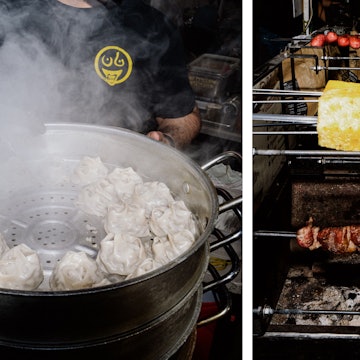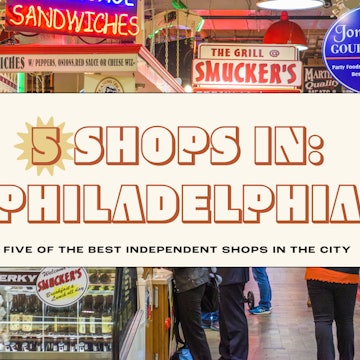
These 5 San Juan souvenir shops highlight Puerto Rican culture
Jan 12, 2022 • 5 min read

Shopping is the best way to support San Juan's local businesses © Lite Productions RF / Getty Images
Lonely Planet has partnered with San Juan-based travel community Platea to provide comprehensive guides, curated lists and insider tips for your next trip to Puerto Rico.
A souvenir is often a common memento of the travel experience. Authentic and ethically made products are meaningful souvenirs that capture a country’s spirit and culture. Puerto Rico is blessed with an abundance of talented creators, many of who’ve learned their craft from generations before them.
From clothing and accessories to art and food, here are ways you can make a positive impact on Puerto Rico’s economy and community during your next visit to San Juan.
Isleñas
Born and raised in Puerto Rico, founder Karla López Rivera lived and worked as a footwear designer in New York City before moving back to the island to launch Isleñas. The company name is Spanish for “female islander,” an apt description of the product, as well as where and by whom the stylish sandals and espadrilles are crafted.
López Rivera aims to create beautiful, comfortable and well-crafted shoes for women. However, her main goal is to create new and fair opportunities in the creative field using one of the island’s most abundant assets – women who sew.
Isleñas partners with local non-profit organizations as part of a train-to-hire program, providing opportunities for women in underserved communities.
While Isleñas is an e-commerce brand with a direct-to-consumer approach, you can purchase their shoes at local retailers, including Luca in Condado and Casa Artisan at the Dorado Beach, a Ritz Carlton Reserve. You can also make an appointment to visit their studio by emailing them.
Concalma
For a unique and practical souvenir, check out the wide selection of bags from Concalma. These chic and lightweight bags range in styles from totes and messenger bags to fanny packs and clutches.
Translated “with calm,” the company name applies to principles founder and designer Matilsha Marxuach holds dear: applying a posture of calm to everyday life, and promoting calm within the industry by championing slow fashion and fair trade practices.
Marxuach sought to design a product that could be produced locally, support Puerto Rico’s economic growth and promote conscious consumption.
Every bag is manufactured through Cooperativa Industrial Creación de la Montaña in the mountain town of Utuado. Due to the pandemic, their brick-and-mortar location on San Francisco Street in Old San Juan is shuttered. But you can order your bag online before you visit and get it at their pick-up window on Calle De la Luna (Moon Street) in San Juan. They also ship internationally.

Puerto Rican Art & Crafts
From traditional hand carvings and paintings to gourmet foods and locally farmed coffee, there’s a seemingly limitless variety of authentic items. Opened in 1981, Puerto Rican Arts & Crafts is still situated in the original building and remains a family-owned affair.
The shop, located Fortaleza Street in Old San Juan, maintains an inventory solely comprised of items crafted by Puerto Rican artisans and creatives. Alongside most items are informational cards with a mini-bio about the artist.
Bring home a vejigante mask, a staple of Puerto Rico Carnival culture that is often depicted with large horns and sharp teeth. Miguel Caraballo, Sr., has been creating traditional paper maché vejigante masks from his home in Ponce for more than 60 years.
His work has been recognized by the Smithsonian. Masks made by the Caraballo family are considered to be the best in Ponce.
Hand-carved santos and reyes (saints and wise men) are traditional art pieces in Puerto Rico and displayed year round. Pieces here were made by members of the Orta family, who are revered for their intricate and original carving skills, a craft handed down from their father, Domingo Orta, Sr.

Spicy Caribbee
Bring home a taste of Puerto Rico with a gift from this darling little shop tucked away in one of Old San Juan’s cobblestone alleyways. Owners Nerieda and Mark Williams opened the doors of Spicy Caribbee in 1988. Today it remains a well-stocked purveyor of seasonings, sauces, jams, chutneys and tea acquired locally and throughout the Caribbean. However, Spicy Caribbee-branded products are especially popular.
Favorites include the Fuego Hot Sauce (their hottest offering); Guava Jam (a top seller) and Doña Nery’s Sofrito (Nerieda’s mom’s own recipe). Their dry seasonings are especially flavorful – their signature herb sea salt and the garlic and herbs blend practically fly off the shelves.
Beans for the dark roast coffee are grown from Puerto Rico’s mountain region of Jayuya. Souvenirs from Spicy Caribee go beyond the culinary realm. Shelves also hold hand-poured soy candles, essential oils, perfume, cookbooks, soap and other distinctive souvenirs worth giving – or buying for yourself.

Don Collins Cigars
Don Collins Cigars can trace its roots back to the Puerto Rico Tobacco Co., established in 1503.
However, the art of cultivating, blending, rolling and smoking tobacco stretches further back to the indigenous Taíno people. Spanish settlers adopted the practice, and the demand for tobacco quickly grew in Spain, Portugal and eventually throughout the rest of Europe.
Spain chartered the Port Rico Leaf Company in 1503. Following a few name changes, they settled on Puerto Rico Tobacco Corporation (PRTC) in the 1920s, as it’s known today. The PRTC established Don Collins Cigars in 1991.
Family-owned since its inception, Don Collins Cigars uses tobacco that is grown, cared for and hand-harvested by independent farmers in the Puerto Rican mountains of Toa Alta. Each cigar is tenderly hand-rolled in the traditional way that’s served the brand well for generations.
Sample a cigar in the store, located at 59 Calle del Cristo, while you savor a glass of Tres Clavos Rum from Vega Alta. You can enjoy it there, or purchase a bottle to enjoy later. Not a rum drinker? Pair your cigar with a cup of Don Collins’ own brand of coffee, which is produced on the island in Adjuntas.
Safety recommendations and restrictions during a pandemic can change rapidly. Lonely Planet recommends that travelers always check with local authorities for up-to-date guidance before traveling during Covid-19.
You might also like:
Walk through Puerto Rico’s history in Old San Juan
Best things to do with kids in Puerto Rico
Top 12 beaches in Puerto Rico













